The Growing Trend of Non-Chinese Manufacturing in Hiking Footwear
In recent years, a significant shift has occurred in the Hiking Companies industry, with many prominent companies choosing to manufacture their shoes outside of China. This movement reflects changing global economics, quality control preferences, and consumer demands for more diverse manufacturing origins. Let’s explore why hiking companies don’t make their shoes in China anymore and what this means for outdoor enthusiasts.
When it comes to hiking gear, especially footwear, many outdoor enthusiasts prefer products made domestically to support local businesses and ensure higher standards in craftsmanship. For those seeking hiking shoes and boots made in the USA, several companies are dedicated to producing quality footwear domestically. Here are a few top brands that manufacture their hiking shoes and boots in the USA:
Best 5 Hiking Companies Make Their Shoes In The USA
1. Danner
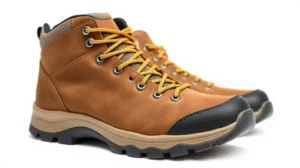
Danner has been producing high-quality boots in Portland, Oregon, since 1932. Known for their durability and craftsmanship, Danner boots are a popular choice for hiking and outdoor activities. Their iconic models, such as the Danner Mountain Light and the Danner Light II, are handcrafted in the USA using top-quality leather and Vibram soles for rugged terrain. These boots are built to last, with a timeless design that appeals to both hikers and casual wearers.
2. Limmer
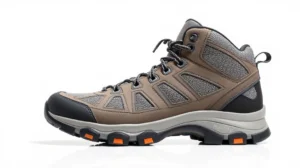
Limmer is a family-owned company that has been making custom and off-the-shelf hiking boots in the USA since the early 1900s. Based in New Hampshire, Limmer boots are known for their handmade construction and use of high-quality leather. While they offer custom-fit boots, their standard hiking models, such as the Limmer Standard and the Limmer Light, are also crafted domestically. Limmer boots are designed for long-lasting durability and comfort on challenging trails.
3. Merrell
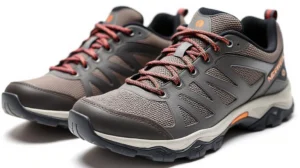
While Merrell is a global brand, some of their hiking boots, including certain models from the Wilderness collection, are still made in the USA. These boots are known for their high-quality materials, including full-grain leather and durable Vibram outsoles. Merrell Wilderness boots are designed for long-distance hiking and backpacking, offering superior support and protection on rough terrain. Merrell’s commitment to craftsmanship ensures that these boots are built to withstand years of heavy use.
4. Keen
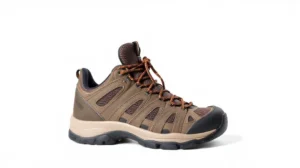
Keen, a popular brand for outdoor footwear, manufactures a portion of their products in Portland, Oregon. While not all of their models are made in the USA, they offer a selection of American-built hiking boots under their “Made in USA” line. Keen’s hiking boots are known for their comfort, wide toe box, and waterproof features, making them ideal for both casual and serious hikers. The Keen Durand and the Keen American Built Collection are good examples of boots that combine innovative design with American manufacturing.
5. Schnee’s
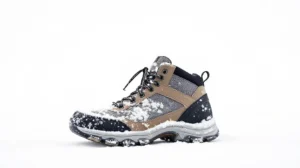
Schnee’s, based in Bozeman, Montana, is known for its handcrafted, USA-made boots designed for hiking, hunting, and outdoor exploration. Their Granite and Beartooth hiking boots are built with high-quality leather, supportive soles, and superior craftsmanship. Schnee’s boots are engineered to provide comfort and durability in demanding conditions, making them a popular choice for avid hikers and outdoorsmen.
Why Leading Hiking Brands Are Leaving Chinese Manufacturing
The exodus of hiking shoe production from China can be attributed to several key factors. Rising labor costs in China have prompted many manufacturers to seek alternative locations. Additionally, concerns about intellectual property protection and the desire for closer oversight of production processes have led companies to relocate their manufacturing facilities to other countries.
Alternative Manufacturing Destinations
European Production Centers
European Manufacturers
- La Sportiva (Italy)
- Hanwag (Germany)
- Meindl (Germany)
- Lowa (Germany/Italy)
Many premium hiking brands have moved their production to European countries, particularly Italy, Germany, and Romania. These locations offer:
- Highly skilled craftspeople with generations of shoemaking experience
- Strict quality control standards
- Proximity to European markets
- Advanced manufacturing technologies
- Strong intellectual property protection
Vietnamese Manufacturing Hub
Vietnam has emerged as a major alternative to Chinese manufacturing, with several benefits:
- Lower production costs compared to China
- Skilled workforce
- Modern manufacturing facilities
- Strategic location for Asian supply chains
- Growing expertise in outdoor footwear production
Quality Control and Manufacturing Standards
One of the primary reasons hiking companies don’t make their shoes in China anymore is the desire for stricter quality control. Many brands have found that operating their own facilities or working with specialized manufacturers in other countries allows for:
- Better oversight of production processes
- More consistent quality standards
- Improved material sourcing control
- Enhanced working conditions
- Greater manufacturing flexibility
Impact on Consumer Prices and Quality
The shift away from Chinese manufacturing has several implications for consumers:
- Potentially higher retail prices due to increased production costs
- Generally improved product quality and durability
- More transparent supply chains
- Greater variety in manufacturing techniques
- Enhanced brand reputation
Environmental Considerations
The relocation of manufacturing has also brought environmental benefits:
- Reduced carbon footprint through closer proximity to markets
- Stricter environmental regulations in new manufacturing locations
- More sustainable production practices
- Better waste management systems
- Increased use of eco-friendly materials
Consumer Response and Market Trends
The market has responded positively to hiking companies that don’t make their shoes in China:
- Increased consumer trust in product quality
- Growing preference for diverse manufacturing origins
- Higher willingness to pay for non-Chinese made products
- Strong support for transparent supply chains
- Greater interest in locally manufactured footwear
Future of Hiking Footwear Manufacturing
The trend of hiking companies moving production out of China is likely to continue, with several developments on the horizon:
- Increased automation in manufacturing
- More localized production facilities
- Growing emphasis on sustainable practices
- Enhanced customization capabilities
- Stronger focus on worker welfare
Economic Implications
The shift in manufacturing locations has broader economic implications:
- Development of new manufacturing hubs
- Creation of skilled jobs in various regions
- Investment in modern production facilities
- Growth of supporting industries
- Enhanced local economic development
Conclusion
The trend of hiking companies choosing not to make their shoes in China represents a significant shift in the outdoor footwear industry. This change reflects broader market forces, consumer preferences, and industry priorities. While this transition may result in higher production costs, the benefits of improved quality control, better working conditions, and more sustainable practices appear to outweigh the drawbacks. As the industry continues to evolve, we can expect to see further diversification of manufacturing locations and continued emphasis on quality and sustainability.
These brands provide hikers with the option to purchase footwear that is not only high-quality but also made domestically. While American-made hiking boots can often come at a higher price, the investment is worthwhile for those seeking durable, long-lasting footwear designed to withstand the rigors of the outdoors.


